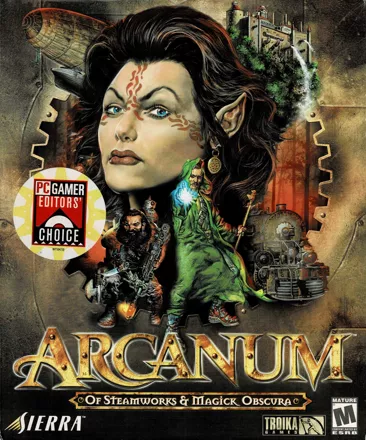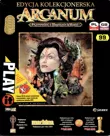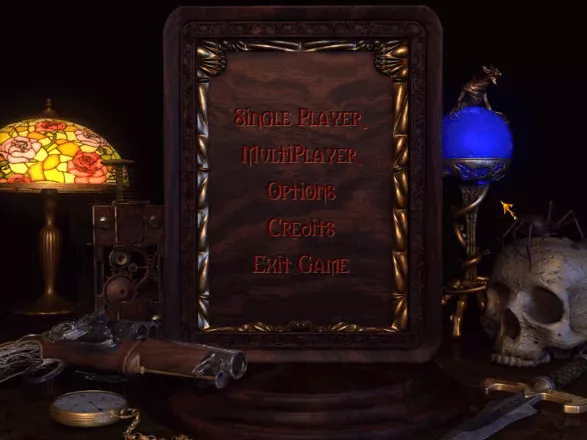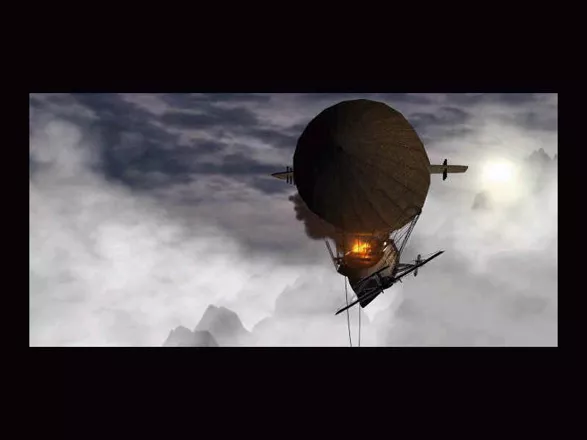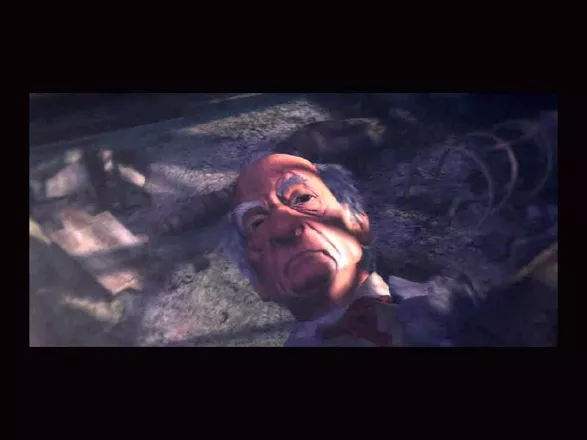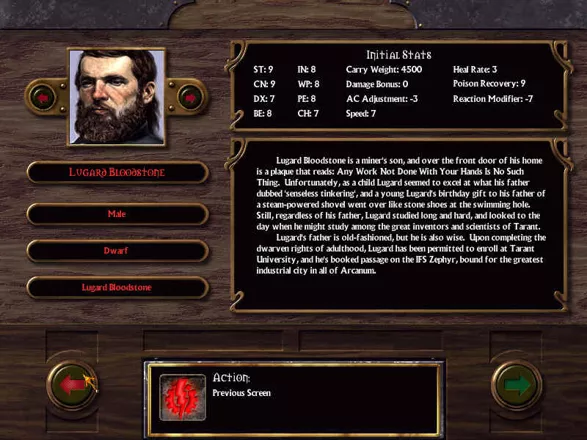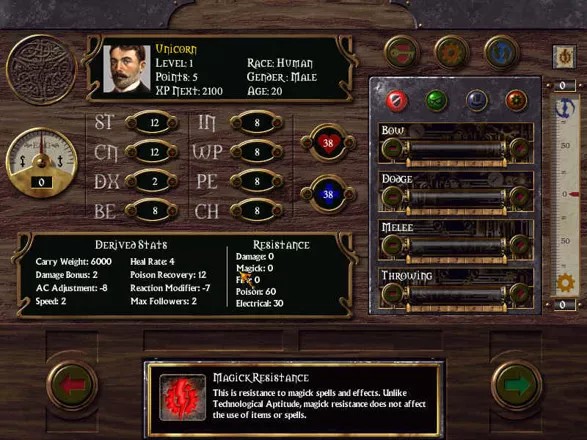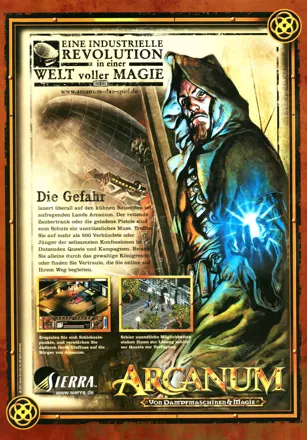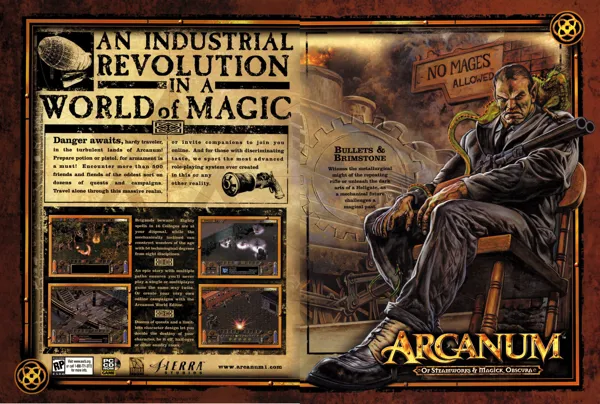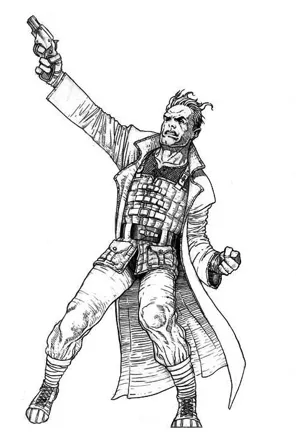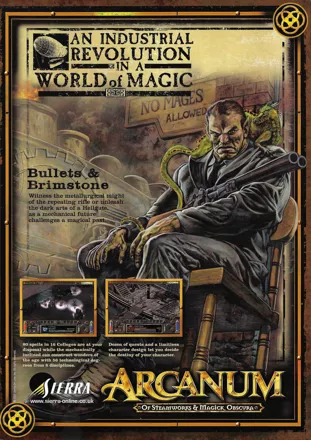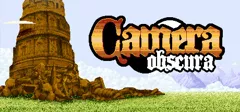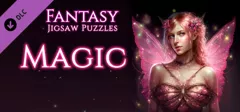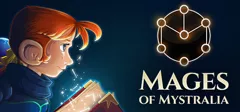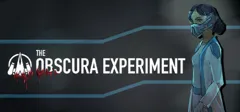Arcanum: Of Steamworks & Magick Obscura
Description official descriptions
The luxury zeppelin IFS Zephyr begins her maiden voyage from Caladon in the Kingdom of Arland to Tarant, one of the largest cities in the technologically advanced Unified Kingdom. Suddenly, while the zeppelin is cruising over mountains, two monoplanes attack it and eventually shoot it down. The two half-ogre attackers die in flames along with all their victims except two who miraculously survived. However, one of them, an old gnome, is mortally wounded. Just before he dies, he gives a silver ring to the other survivor and tells him to "find the boy". The witness of the crash, a man named Virgil, declares that the now only survivor is "The Living One", a reincarnation of a deity, and offers to follow him wherever he goes. The hero begins a long and perilous search for the mysterious boy, the origins of the silver ring, and the unknown enemy who was behind the attack on the zeppelin.
Arcanum is a role-playing game similar in concept and many gameplay principles to Fallout. It is set in a unique world, which can be described as mixture between Tolkienesque fantasy, steampunk technology and elements of British and North American culture of the 19th century: dwarves may carry molotov cocktails, and a half-orc protagonist can travel by train between Victorian-like cities. Magic and technology are opposed to each other; most humans and dwarves embrace technology, while some elf clans stick to the old ways and consider scientific progress evil.
In the beginning of the game the player creates the main character, choosing from a variety of races, attributes, magical or technological disciplines, social skills, backgrounds, etc. When the character levels up, the player can increase his main parameters as well as any available skills. Like in Fallout games, the player directly controls only one character; however, companions who join the party may be given orders, and their inventory can be managed by the player.
The game is open-ended: the player is free to explore the vast world from the onset, undertaking a large amount of side quests or following the main story. Social interaction plays a significant role: depending on the player character's charisma and intelligence attributes, as well as persuasion skill, many problems can be solved in a non-violent way. The amount of companions willing to follow the protagonist also depends on the latter's charisma rating; companions may also leave the party if they disagree with the hero's behavior.
The player can select one of the three combat modes for the game: real-time, turn-based, and fast-paced turn-based. Turn-based mode is similar to the combat in Fallout games: characters require action points to move, attack, or cast spells.
The game includes an editor called WorldEdit, which allows players to create their own maps, campaigns, and non-playable characters. Objects from the base game can be carried across to the player-created scenario. The scenery editor allows players to create their own objects. It is also possible to set and change game variables, i.e. the amount of skill points required to perform a specific task.
Spellings
- 奥秘:技术与魔法 - Chinese spelling (simplified)
Groups +
- BestSeller Series (Cendant / Havas / Vivendi Universal) releases
- Fantasy creatures: Dwarves
- Fantasy creatures: Elves
- Fantasy creatures: Gnomes
- Fantasy creatures: Halflings / Hobbits
- Fantasy creatures: Orcs
- Gameplay feature: Alchemy
- Gameplay feature: Brothels
- Gameplay feature: Character development - Skill distribution
- Gameplay feature: Gambling
- Gameplay feature: Karma meter
- Gameplay feature: Multiple endings
- Middleware: Bink Video
- Physical Bonus Content: World Map
- Protagonist: Female (option)
- Sound engine: AIL/Miles Sound System
Screenshots
Promos
Videos
Add Trailer or Gameplay Video +1 point
See any errors or missing info for this game?
You can submit a correction, contribute trivia, add to a game group, add a related site or alternate title.
Credits (Windows version)
157 People (118 developers, 39 thanks) · View all
| Project Leader | |
| Lead Programming | |
| Programming | |
| Design | |
| Animation | |
| [ full credits ] | |
Reviews
Critics
Average score: 79% (based on 61 ratings)
Players
Average score: 4.0 out of 5 (based on 168 ratings with 13 reviews)
The Good
This review is long. I apologize; I didn’t intend to waffle. If you decide not to read this because of its length, I perfectly understand you, and probably would immediately join you for a beer. But for the sake of my favourite genre, role-playing games, I have to explain in detail the errors of Arcanum. Because they are legion, and because they are fundamental. And now that you’ve made it this far, you could actually go on and read the whole text.
The Bad
Know this then: Troika Games consists of the people who created Fallout. Fallout was, and is, one of the most perfect role-playing games ever designed.
It is important to know these two things to understand the scope of Arcanum’s failure. Because everything that Fallout did right, Arcanum does wrong. On the plane of consciousness on which the game was created, which is certainly not our own, this might even be some sort of achievement.
Arcanum is not a bad game. In a certain respect, I wish it were; you can feel pity for the cripple, but a bore moves no one. As it is, it is hard to understand how Troika could have the cheek to publish a game that is so obviously outdated without making absolutely, perfectly certain that there is a healthy body under the rags. Instead, the garb covers a slip of a game dragging itself along.
Enough grumbling already. Let’s hear the facts.
I will never tire of stressing the brilliance of the Fallout skill system; in my book, it can hardly be improved. Arcanum exemplifies this point nicely, as they tried. To be fair, Arcanum’s skill system is still its strongest point; the specialization works reasonably well (although the game not nearly enforces it well enough), and the tinkering with technology is great fun. However, Troika confused quantity for quality and bred confusion. The problem is really simple: you have so many choices that you cannot decide on one. This might be called freedom, if it wasn’t for the game’s lack of guidance. You can only guess which skills might be useful; in fact, many aren’t at all. Any master gamblers out there? More: Why is there one point for all talents? Fallout showed how a wise structuring of skill areas can greatly improve comprehensibility. Why must the basic skills be changeable? That makes your character a wobbly turncoat instead of a clearly defined specialist. Why do Arcanum characters level up so frequently? This greatly diminishes the overall importance of levelling. If you play Arcanum and understand why freedom is not always a boon, the game may have a purpose after all.
Arcanum is the Might & Magic of 2D role-playing games: lots of insignificant quests, almost insulting in their stupidity, piling up like trash along the main road. I have nothing against a variety of challenges, but I demand exactly that: variety and challenge. At best, I hope for side-quests that arise naturally out of the game world and are motivated through the plot. Look at Baldur’s Gate 2, for example, where the desperate need for ransom money forces you to do menial tasks, or where you are – brilliant idea! – unexpectedly offered quests that concern one of your party members. Disappointingly few of Arcanum’s quests are sensible in this way, even less are remotely interesting.
Even worse, this is also true for the dungeon mission, regardless whether they are plot elements or not. Sad highlight is the Tarant sewer, an endless maze of blue-grey tunnels in which the designers threw in monsters at random, but forgot to throw in some sense as well. Even the randomly created dungeons of Diablo are more varied (and a lot more thrilling) than the hand-made corridor deserts of Arcanum. Pinch me, maybe I’m ungrateful. Probably it’s asked too much that dungeons are exciting, and an extra dose of enemies always makes up for the lack of those other things, wosname… puzzles.
You might not have noticed, but you have companions. Yeah, the guys that join your group until the next fight, when they die. Party members can be a great utility to increase a game’s depth. Take a look at Baldur’s Gate 2 once again to see how gripping a cleverly designed party can be. But try and answer me this question: What good are the companions in Arcanum? Please, this is serious, think! My little brother has put it perfectly in one word: packhorses. They carry around extra stuff. That’s all. And that’s sad. Generally spoken, companions could, and should, serve two purposes: contribute useful additional abilities to broaden the choice of actions, and enrich the atmosphere. The second job is more important and generally paid less attention. The Arcanum companions serve neither purpose, as their talents are of little value (Virgil has not opened one single lock successfully for me, Magnus can build utilities that I don’t need, and so on), and they follow you around speechless like zombies, when they could enhance the atmosphere so much by commenting on each situation, quest or person -- a huge chance wasted. If a game feature is useless, then it should either be improved or removed.
Oh, the fights. I cannot help but think that Troika would have preferred doing without. The battle system of Arcanum is, well, functional. It serves it purposes, i.e. killing evil guys. Sorry to insist, but I have another question: Why do you fight in Arcanum? I believe there is an answer to this question on a general level, but it doesn’t apply to Arcanum or to many other games. Somewhere along the line of RPG creation, the purpose of battles must have been lost. Fights should first and foremost be challenges. Tactical challenges. A good RPG fight is always a matter of superior intelligence against superior strength. Only then can a battle be thrilling and rewarding. It doesn’t matter whether the strategy is correct use of weapons, spells, formation, action points, timing, you name it; what matters is that you can use it, and that you can win by using it correctly. The Fallout fights were tactical in their use of action points, weapon choice and targeting system; no surprise that they were refined into a full-fledged strategy game (Fallout Tactics). In Arcanum, battles serve only the two lesser purposes: as obstacles and delays (a use which sooner or later exhausts the players’ patience), and as a means of acquiring experience points. Hey, think hard, was there a memorable fight in Arcanum? On second thought, don’t strain your memory.
If you played Arcanum, you probably know that there is a skill cap at level 50. I find the necessity for caps dubious on principle, but in Arcanum it is actually understandable: Your hero simply grows too strong too fast. This is only one of the effects of bad balancing. There are many more. Take the plot, for example. Actually, the story of Arcanum could be quite interesting. Unfortunately, it is stretched so thin over the first half of the game (up to the Isle) that it hardly moves at all. Especially in the beginning of the game, a fast pace is essential to wake and bind the player’s interest. In short: things need to happen. In Arcanum, things happen very, very slowly, and those that do are not really thrilling (“Oh, you found me! Now search that mine”). So, the plot would have needed tightening. Also, as a friend of mine pointed out very rightfully, the program does nothing to encourage a decision for either magic or technology. Again, don’t mistake that for freedom. A strong, early opposition of forces would not only create dramatic tension, it would also increase the replayablity a great deal -- after all, you’d like to see the other side, too. But again, a chance had, a chance thrown away.
Lastly, and most importantly, there is the issue of technology. Mind you, I can live with Arcanum’s graphics, even though I feel that sting when I look at the other games on the store shelf and the 40 bucks in my hand. But what I cannot live with is the game’s speed. In fact, to publish a game that looks like a mid-90’s relic and jerks like a slide show on a PIII is an unbelievable impudence. I don’t know what technical challenges the programmers faced, and I don’t care; I expect a working product for my money. If a TV salesman told me “Did I say constant viewing? Well, it shows static every few seconds, of course”, he’d see static for more than a few seconds. This technical botch-up is not only unnerving, it is also a genuine mood-killer; if the screen is drawn once a second, I can no longer enjoy the illusion to explore the exiting city of Tarant, but I am constantly reminded that I’m sitting at my desk and staring at a computer.
Thank you for your patience. If you were clever, you scrolled down directly to this paragraph in expectation of a summary. Here it is: Arcanum is a mediocre game in every respect, as it disregards basic guidelines that every game, especially role-playing games, should follow: pace and flow, guidance and soft pressure, depth without confusion, atmosphere and credibility, and especially, meaning. Meaning in a computer game? Not in the philosophical sense, not necessarily. But in a down-to-earth, every-day sense: telling the player what he has to do, and why. If there is meaning, what follows is motivation.
The Bottom Line
A huge disappointment for RPG fans, Arcanum tries to fly to the stars with a wooden rocket. Compared to Fallout, Arcanum is not one step, but a fair afternoon walk backwards. How on earth this could happen is beyond me; if anybody knows and is willing to tell, he could restore a distressed man’s sleep.
Windows · by -Chris (7762) · 2001
Gnomes with guns and bits with bugs
The Good
Arcanum's setting is great. The blend of steampunk and fantasy is a welcome change from the Forgotten Realms or uninspired clones thereof that are all too often found in computer role-playing games. The setting goes far beyond just having gnomes with guns. It manages to capture a Victorian atmosphere and fuse it believably to its Tolkienesque world with a lot of attention to detail, from exploited orcish factory workers and a certain degree of racism towards orcs and half-orcs, including player characters, in general to mages not being allowed near locomotives out of fear of malfunctions, because the conflicting nature of magic and technology.
This conflict is also present in character generation, with a character that is strong in both magic and technology being just about the only thing you can't generate. Other than that you're pretty much free to do what you want. Like in Fallout, which was made by many of the same people, your character can be anything you want and the game is playable as almost everything as well. From stupid thieves to pacifistic chemists and from homicidal gunslingers to goody two shoes necromancers, anything goes. Many quests, including the main one, have more than one way to solve them, so the choice is really up to you, giving the game a lot of replay value.
The storyline is good, although it starts a bit slowly and even though is mainly linear, there are different paths and different endings depending on your choices along the way. The story will take you across the whole continent of Arcanum, from jungle islands to desert wastelands and from elven cities to dwarven caverns. All of these places are filled with side quests which range from simple delivery boy and assassination quests to elaborate conspiracies and political machinations. Still, there are entire villages that are completely optional, leaving much room for exploration. An interesting feature in this regard is that the whole world is like a huge canvas. If you keep on walking to the north east from Shrouded Hills, without going to the world map, you will eventually arrive at Tarant, just as if you'd traveled there via the world map. While doing this would be tedious and pointless, I appreciate that there's the possibility as it gives, to me at least, the whole world a sense of coherence as it doesn't just consist of isolated locations but also of the wilderness between them.
I also enjoyed how characters react to you differently, depending on your race, gender, reputation and technological or magical aptitude, even on some your equipment, like barbarian armor or a smoking jacket and that a character's equipment is reflected in both his graphics and his inventory. If you kill a servant, you'll be able to take and wear their uniform and if somebody attacks you wearing plate mail and wielding a broadsword, you will be able to take and use them as well after you defeat him. Assuming, of course, that the armor is your size, because small armor will only fit half-lings, dwarves and gnomes and elven chainmail is too small for half-ogres.
The Bad
However, just as most of Fallout's good aspects are present in this game, so are some of its not so good ones, unfortunately. First of all, there's the issue of bugs. The release version had lots of them and even after the final patch a couple of them remain. Mostly minor stuff, but annoying nonetheless and distracting from the game's otherwise great atmosphere. Also, the tile-based graphics are best described as functional. Streets are always at right angles and most buildings look exactly the same. There's little variety in the way dungeons look and most animations are wooden. Even special effects like spell animations aren't really spectacular. The graphics weren't state of the art when the game came out and certainly aren't now, but they get their job done.
Finally, there's one aspect that wasn't handled quite as well as in previous games and that's the combat. The game offers both a trendy real-time mode and a turn-based alternative. Unfortunately, neither works as well as those in other games. The real-time mode is not pausable and very hectic whereas the turn-based mode doesn't give you clear information how many action points each action is going to take. Additionally, real-time combat seems to favor ranged fighters whereas melee specialists seem to have the edge in the turn-based mode. Combat is arguably neither the focus of the game nor is it very hard as characters can get very powerful very quickly, but it's a pity it wasn't executed better.
The Bottom Line
Overall, the game is a worthy successor to Fallout and a true computer role-playing game. If you like role-playing games in general or Fallout in particular, this game is for you. If you like unusual settings in general or steampunk in particular, this game is also for you. However, if you like flashy graphics and lots of gunslinging action, you'll probably have to look elsewhere.
Windows · by Anym (165) · 2006
It's Kinda Like A Turn Of The Century Shadowrun
The Good
In missed Arcanum, when it was first released in 2001. Some years later, I stumbled onto the game while searching the ‘net for new RPGS to play. I was almost immediately drawn to the game. It was from Troika, a developer made up of former Fallout designers. Since I loved Fallout, I became even more interested in the game. How had this gem of RPGS escaped my attention?(Maybe I’m slipping in my game prowess;) The setting of the game intrigued me as well, I downloaded the demo, to ensure that Arcanum would run on my new PC. And to see if the game was a cool as it sounded in the reviews I had read. To find that the answer to both questions was a resounding, yes!
Got Magick? Or Perhaps A Bit Of Technology?
In Arcanum: Of Steamworks And Magick Obscura, you begin by either picking a pre-made character to play, each with their own back-story. Or as in most PC RPGS you can create your avatar. The character creation system is deep and similar to Fallout, if anything it is even deeper. You have control over gender, race, skills, and even back round. The races run the gamut from human, elf, dwarf, to Half-Orcs, and everything in-between. Some races, I.e. dwarfs do not allow you to play as a female, and while some may see this as a draw back it is a small one at the most. Skills are what you are proficient at. From magick, to tech, every thing is at your fingertips. You can be a mage dwarf, a tech Half-elf, or anything else you can imagine. Attributes correspond to skills and vice versa. For example gamers that prefer using guns, will need a high perception. Back rounds are optional, but can enhance the gameplay, if used. You can choose from tons such as, “Child Of A Hero”, “Inheritance” , etc. These often add something extra to your avatar, but act as a double edged sword as they often also take something away. As the “Inheritance” back round, will allow you to start with more cash. As well as penalize your willpower attribute.
What about classes Mr. Megid? You ask. Well allow me to educate you, no pun intended. In Arcanum, classes, such as fighter, mage, thief, etc. Do NOT exist. At least not in the traditional since. Arcanum never tells you what your class is. In a gameplay sense, it more depends of how you play the game. If you are proficient with magick, you will gain spells as you continue leveling up. As there are many magick “colleges”, I will not go into it. But you can master one such group, or mix and match, it is your choice.
More fun is the technology “classes”. Like with magick you can choose what if any tech stuff you wish to learn. You can be a gunslinger, a gunsmith, or both. You use mechanized armor, as well as create items, like some kind of mad scientist. So you could be a gun slinging thief. Or a sword-wielding inventor. Or just about another eclectic combination you can conceive.
“There Can Be Only One Living One!”
Arcanum, begins with an attack on the Zephyr. A newfangled Airship. It goes down half-way to it’s intended destination. Upon waking up in the wreckage of ground zero, you desperately search for other survivors. And discover a gnome, he implores of you to “…find the boy”. He hands over a signet ring, and dies, with his cryptic message ringing in your ears. Near the wreckage you meet Virgil, a human cleric. Among his ramblings he revels that you may be the chosen one. “He Will Be Born Upon Wings Of Fire…”. That could be you, after all you were sort of born of wings of fire. From here you are directed to find Virgil’s mentor as he could explain the prophecy in more detail. The plot thickens as you learn of assassins, known as the “Molecan Hand” are out for your blood. The dwarfs of the “Black Mountain Clan” have gone missing. And dark elves are trying to see the return of Arronox, a villain from Arcanum’s colorful past.
The plot is one of the game’s strongest points. Every time you think you have an answer you inevitably end up with more questions. It is very mysterious, and paced superbly. I always found myself wondering how everything fit together. I was practically glued to my monitor from start to finish. Now mean feat considering Arcanum has a lot to offer, with a 30-40 hour campaign, plus tons of side quests, and optional areas to explore, they game can easily take up to 60 hours to complete.
The side quests are very fun to do. Unlike a lot of other RPGS that shall remain nameless. But in the end the main quest steals the show. And the plot twists are is a word genius. I won’t divulge them here, but rest assured you will never see them coming.
There Ain’t No Party, Like An Arcanum Party, Cause An Arcanum Party Don’t Stop!
In Arcanum, as in many other RPGS you can amass a party of followers. However the party or follower system works a little differently than what you may have seen in other RPGS. The number of followers that can join in your significant quest, is based on your charisma. The higher it is the more people will follow you to the ends of Arcanum.
Building a diverse party is as per usual in RPGS is the key to success in Arcanum. Having a mix is more fun as well as help make the game easier. My party consisted of a cleric, Half-Ogre ass kicker, a loyal dog.(A.K.A. Worthless Mutt, somewhat a misnomer as he is far from “worthless”) A tech-inclined dwarf, and last but not least, a smoking hot elf babe with a penchant for the mystical arts.
Certain characters will not join you if you are either too good or too evil, too magick or too tech. Giving the game replay value. Some are more talkative than others as well. Virgil for example will always have something to add in verbally. He greatly enhances the plot, and gives a better understanding of the world of Arcanum. Raven, the aforementioned smoking hot elf babe, will often provide you with good info as well. And if you are playing as a male human, elf, or half-elf, she may fall in love with you, if you treat her right.
I Want To Live In Arcanum!
Another of the games greatest strengths, is the unique fantasy world that is Arcanum. As I mentioned earlier, the world is in a turn of the 19th century fashion. With the once magick only world of Arcanum, now going through a technological revolution. Magick is aversely affected by technology, and technology by magick. At the same time there are ancient ruins, as well as high tech “Metropolis” inspired cities. Elven forests and vast railroad networks. And unlike the setting of some RPGS, Arcanum never stumbles and makes this eclectic mix seem believable. And always interesting. Very few other RPGS every manage such a unique world. For some reason many RPGS neglect to make the fantasy world believable, despite the fact that it is a very important in not the MOST important role of fantasy is to make the world seem real. A few other RPGS that also pulled it off include, Planescape: Torment, Jade Empire, and Shadow Run.
“Vae Victus!”
The combat in Arcanum comes in various flavors. There is the traditional turn-based, fast turn-based, and real time. The real-time combat is probably the worst as you have no control over the fights. Fast turn-based, is just that, a faster turn-based combat.
I found that the tried and true, turn-based works the best. It is very similar to Fallout. As in you have meter that is color coded. Green dots are your action points, with these you move, attack, use items, and magick, if you have any. When you deplete points the dots turn red, and yellow, as the enemies attack and your follower perform actions.
You have no direct control over your party unlike many such games. However they often do what is expected of them, so you do not need to worry about shitty A.I. Doing stupid things, They will attack, or heal, or whatever is most needed.
Outside of battles, you can have your party members trade items, heal you, or discuss various things.
Beyond Good And Evil
As with your class, your reputation, is based on what you do, not what you pick as in games like Baldur’s Gate. If you act like an evil prick, people will treat you like one. If you are good and act heroic, people will treat you like a hero. Or perhaps you shall be born with a heart full of neutrality, once again it is up to you.
Followers will also react to your choices. Some may be coerced in to doing evil, others will not, and will let you know it. Some do not care either way. And of course evil followers do not like “little goody two shoes”.
There are also “fate points”. They can be earned by doing heroic acts as well as evil acts. A fate point is used to automatically help you pick locks or persuade someone, despite your skill in the said area.
Reputations can also be gained. For instance if you report to the newspaper printer, that you are the sole survivor of the Zephyr, citizens of Tarant, will be nicer to you. You can also gain negative reps, such as Tarant Pervert, if you run through the streets naked.
The visuals and audio in Arcanum, are pretty good as well. Firstly the graphics, you likely have noticed that for a game from 2001 Arcanum looks a little dated. After all, this was the same year that gave us the amazing visuals of Morrowind, as well as Neverwinter Nights.
This is likely due to the fact that Arcanum is based of the graphics engine of Fallout and Fallout 2. And was in development for quite a while. Do not misunderstand me, the graphics are good, but not mind-blowing. Besides I like the look of 2D RPGS, a rarity these days.
The sound and music are overall better than that of the visual department. One could easily say that the sound is excellent.
The score is can be epic, and also quaint. It also fit’s the game very well. And sounds proper, for a game set in a world similar to the late 1800’s of American history. The sound effects all sound excellent, and work very well in the game. In this area Troika’s Legacy really shines. From the slash of blades, the arcane whirl of magick, and the boom of a shotgun, it all sound amazingly realistic. They even have the ambiance covered. When near the ocean, you can hear the waves crash on the shore. In dense forests the various animal sounds let you know you are not alone, in the wilderness.
The Bad
There are often graphical glitches. And the game tends to become unbalanced. As in the first 10 hours or so, the game can be very challenging. Yet the mid and later portions of the game are WAY to easy
Other quibbles include: sometimes party members do not understand, and action. For example in one side quest, about halfway through the game. You must kill a elf that is possed by a demon, thereby freeing his soul. The problem here is that your good party member often do not understand, that you are killing a man, but to save his soul. And therefore they will bitch. And may leave the party.
Also sometime a follower will not listen to you, and ignore your request to healed. And as you get stronger healing spells often fail.
And finally the ending may disappoint some. My beef with it however is this: to achieve a perfect good ending, you have to solve most of Arcanum’s main problems if, you should fail one, you will get a worse ending. And as some of the events you must fix are early on in the game, you likely will miss at least a few. But then again the multiple ending possibilities as well as gameplay problems will provide many reasons to replay the otherwise amazing game.
The Bottom Line
At the end of the day Arcanum is one of those ever so rare games. The ones that are flawed, but for every flaw there is also something that overrides it. And makes you forgot all the flaws.
This combined with the vastly original setting and enthralling plot, help make Arcanum, one of the most fun and most complete RPG experiences that I have every had the pleasure of playing. Trust me I have played hundreds of games.
And since the sequel was cancelled, this is as good, as it gets. The sequel was going to be a first person RPG in the vein of Deus Ex. Too bad, it would have been cool to see the world of Arcanum is glorious polygons. As well as would have given us another P.O.V. of one of gaming's most unique RPGS.
Windows · by MasterMegid (723) · 2006
Discussion
| Subject | By | Date |
|---|---|---|
| [false alarm] glitch: no speech? | Rola (8483) | Oct 20, 2018 |
Trivia
Graveyards
A hidden graveyard, containing tombstones of Arcanum's most diehard fans, can be found at the location W: 1060 S : 809 on the world map. Another graveyard has lots of humorous epitaphs written on the graves. However, many of them are taken directly from Baldur's Gate.
Manual
Following on the tradition started in the Fallout manuals, Arcanum's manual includes an actual cooking recipe. This time it's Grandma Cookhill's Three Bowl Bread.
Mod pack
On 7 January 2002, the development team released a free mod pack, containing six new and exclusive adventures. It can be downloaded here.
Mods
Chris Beddoes has produced a mod for this game that addresses some balance issues, makes it overall a little more challenging, and replaces the entire opening area and quests. This latter is important because the opening area was used in the demo, and many players have just seen it too many times to want to start a new character any more, despite the near-infinite possibilities for character design. It can be found here.
References
- There's a location in the game called the "Isle of Despair" which is a penal colony which holds it's inmates in a remote island behind a magical barrier that makes it impossible to escape. Now, when asking the generic NPCs for its location, they answer:
"You mean the Black Isle? I'm not quite sure..."
Black Isle Studios is the name of Interplay's RPG division, and the former home of Arcanum's development team.
- A portion of the Stillwater giant quest contains a major (and fairly obvious) reference to Monty Python and the Holy Grail, specifically the part where you have to trace the beast to a cave and capture it. In fact, the whole sequence plays just like in the movie, you follow some giant footprints, enter a dark cave filled with bones and dead bodies, and so on.
- There's a Fallout reference in the walled city of Tulla. Apparently one of the students had to venture out in the Wastes to find a Water Gem. He has since returned and the Mages fear how the journey changed him and the influence he might have on other students. Plus, he's wearing mechanized armor.
- There's actually a reference to Bill Gates and Microsoft stealing the ideas for their Windows operating system from Apple's MacOS. One of the most influential and wealthy of people in Tarant is Gilbert Bates (Swap the G and B in Gill Bates and you have Bill Gates) because he brought the power of the steam engine to mankind. Another steam engine developer, called Cedric APPLEby is spiteful of Bates's success and claims that he invented the steam engine first and that Bates had stolen the idea off him.
Server shutdown
The official online servers were shut down on 1 November 2008.
Soundtrack
The soundtrack to Arcanum was composed by Ben Houge for string quartet and was provided in its entirety on Computer Gaming World's May 2001 demo CD.
Both the soundtrack and its sheet music are available as a free download.
Stillwater giant
Despite the result of the associated quest, the Stillwater giant DOES exist. It can be found on a random encounter between Stillwater and the pass to the elven city.
Information also contributed by Rambutaan, Sciere, Terrence Bosky, uclafalcon, Unicorn Lynx, weregamer, Wojit and Zovni
Analytics
Upgrade to MobyPro to view research rankings!
Related Sites +
-
Arcanum Walkthrough by Quandary
by Steve Metzler -
Developer's Site
Troika's Arcanum page -
Hints for Arcanum
Having trouble with Arcanum? These hints are arranged in question and answer form to help you solve it on your own. Includes complete solutions. -
Mike's Arcanum Resources
A really good Arcanum fan site with many things you can't find elsewhere. -
Official Arcanum Website
The Official Sierra: Arcanum Website (English) -
Official website (german)
Official website (german) -
Sierra: Arcanum - Soundtracks
The Arcanum soundtrack is officially available for download here! -
Terra Arcanum
Wonderful fansite with walkthrough and good gameplay hints.
Identifiers +
Contribute
Are you familiar with this game? Help document and preserve this entry in video game history! If your contribution is approved, you will earn points and be credited as a contributor.
Contributors to this Entry
Game added by Unicorn Lynx.
Additional contributors: Zovni, Kaliban, Indra was here, Jeanne, phlux, JRK, tbuteler, jsbrigo, Alaedrain, Patrick Bregger, Plok.
Game added August 25, 2001. Last modified April 5, 2024.
